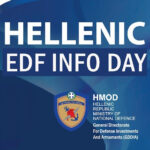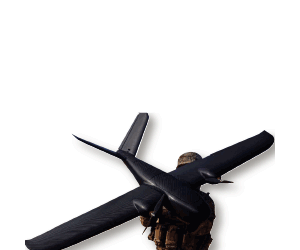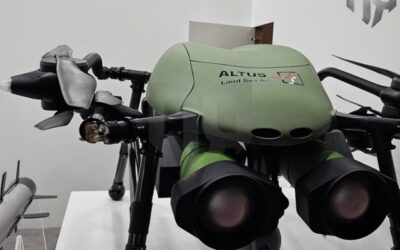MULTIMEDIA CORNER
MULTIMEDIA
CORNER

The second Podcast season of “Defence ReDefined” kicked off dynamically yesterday. In the first episode of this second season, we watched an interactive Podcast with Nasos Kolovos and Dr. Grivas Konstantinos on, among other things, the great defence agreement of Greece with France and in particular the new supply of frigates of the Hellenic Navy.
The professor of Geopolitics and Defence Technologies at the Hellenic Army Academy, Mr. Konstantinos Grivas, analyzed and commented on a number of topics. Let’s take a look at the highlights:
Developments in the international political arena
In the wake of the AUKUS agreement and the supply of nuclear-powered submarines by Australia from the USA and Great Britain, Mr. Grivas was asked whether Anglo-Saxon geopolitics is once again at the forefront, and if so, to what degree this involves China.
The Professor stressed that the agreement brings changes to the international system, the form of which is still unclear. He also commented that the US-led unipolar world is a thing of the past and that we have entered a multipolar international system.
In fact, he observed that a Great Power (USA), a Medium Power (United Kingdom) and a Small Power (Australia) have created a kind of Anglo-Saxon, geopolitical sect catalyzed by the Australian supply of submarines, the logic of which brings Russia closer to China, despite the competing elements of the latter two in their identities, while with this move the unity of the West is questioned after the annoyance of France due to the creation of a “clique” among the Anglo-Saxons with ethno-racial criteria.
Asked how these developments affect Greece, he commented that a huge opportunity is being created for Hellenism (Republic of Cyprus and Greece as a single indivisible identity) for a balanced, allied relationship with France, which has sought and taken its own area of responsibility. Finally, he added that he does not expect anything similar (an alliance) from Israel.
Also read: Australia | AUKUS Agreement – Revokes 34 billion euro French submarine contract
Prospects for the National Guard
Asked about what “artillery on steroids” means and how it can increase the power of the National Guard, the Professor said this notion is a military reflection of the impending geopolitical transition. In particular, he stressed that this is an American invention against the creation of “bubbles of anti-access/area denial (A2/AD)” primarily by the Chinese and secondarily by the Russians and other enemies (Iran, North Korea).
Thus, the USA created some “needles” (loitering munition, high-energy missiles, rocket launchers, warships, submarines, and artillery operating in a network-centric mode with cross-fire capabilities) to break these bubbles by taking advantage of technological advances in the increase of the range, the accuracy of the blow and in the variety of results that the latter can bring. He concluded that the difference is made by the firepower and how much damage one can do in a given space and time.
As for the second part of the question, he commented that such artillery is cut and sewn for the operational needs and geographical data of the National Guard and therefore, could become its backbone. According to the Professor, the concept that the National Guard cannot face the Turkish war machine is wrong and should be replaced by a theory not of resistance and deterrence, but of victory.
At this point he even emphasised the existing solutions to the issues of obtaining target acquisition and data protection from an enemy Air Force with tactics of concealment/camouflage and the so-called primitive infrastructures (tunnels), taking the example of Iran, thus creating contact denial with the enemy’s Air Force.
Respectively, then, the National Guard could potentially cancel out the Turkish advantages in the air, but also the large number of Turkish army that will operate in a limited space, making it an easy target that can receive an overwhelming blow.
Also read: 120 mm RT61 Mortars | The heavy mortars of the National Guard
Supply of frigates
Asked if the choice of FDI HN meets the operational requirements of the Hellenic Navy, Mr. Grivas replied that no proposal is perfect, including the French, as all have their drawbacks. However, the combination of the weapons system with the potential geopolitical benefits made the French proposal prevail over the rest.
He also added that it was the best financial proposal for the Navy and its first choice, while the operational advantages outweigh any disadvantage, giving special emphasis to the addition of the Aster-30 missile to the Greek arsenal.
Regarding the other proposals, he described the American one as suspicious, expressing his concerns about what technology and weapon systems the USA wants to release in Greece, while the rest were worthwhile, but in total were lagging behind compared to the full French package.
Defence Assistance Clause
Regarding article 2 of the Greek-French agreement, Mr. Grivas spoke of the success of the Greek Government. However, he stressed that, even if the French are willing to assist in any incident, this will be done indirectly with either a flow of weapon systems or intelligence, but at the end of the day Greece should not deify the alliances, as no one will fight on its behalf.
Also read: Greek-French alliance | Three Belh@ara and mutual military assistance announced
Domestic Defence Industry
Finally, Mr. Grivas mentioned, regarding the domestic defence ecosystems in Greece and Cyprus, that the raw material is there; the trained personnel, which has created knowledge-intensive entrepreneurs with solutions of the 4th Industrial Revolution, but this potential is suffocating.
According to him, a low-cost national program is needed to support young scientists and consequently domestic production. Israel is a shining example, while DEFEA presented a small sample of these possibilities. The idea of the sterile purchase of weapon systems without respective domestic production only creates deadlocks.
Also read: DEFEA 2021 – ALTUS LSA | Innovative UAVs for every use – VIDEO
THEON INTERNATIONAL PLC | Among the leading high-growth and technology companies of Euronext Tech Leaders
THEON INTERNATIONAL PLC (THEON), one of the leading manufacturers of night vision and thermal imaging systems for defence and security…
Racing “patrol vehicle” of the Hellenic Police hits the road – VIDEO
The motor sports competition team of the Hellenic Police was seen a few days ago in the city of Kalamata. The race of the “patrol vehicle”…
THEON INTERNATIONAL’s MIKRON Night Vision Goggles make Netflix debut
THEON INTERNATIONAL announced that its cutting-edge Night Vision Goggles MIKRON have made a thrilling appearance…
EUROSATORY 2024 | Missile Artillery Solutions from MBDA
With such a large number of interested attendees at MBDA’s pavilion at the Eurosatory 2024 Defence exhibition, the stand reminded of an…
KNDS | Showcases full range of LEOPARD battle tanks at EUROSATORY
KNDS continues to expand its technological advantage in the field of main battle tank development, as we have witnessed at the Defence and…
THEON SENSORS | Distinguishing appearance at EUROSATORY 2024 with new range of products
THEON SENSORS attended the International Defence and Security Exhibition EUROSATORY 2024 as an ambassador of Greek innovation…
Ministry of Defence | Organization of Hellenic EDF Info Day
A Conference entitled “EDF Info Day” is organized in the Amphitheater of the National Gallery on Tuesday, July 9 from 09:00 to 17:00.
ALTUS LSA | Participates in EUROSATORY 2024 with KERVEROS in the foreground
The participation of ALTUS LSA in EUROSATORY 2024 is among the Greek participations of operational significance.
Freddy Beleris | Ιn jail until October
The elected mayor of Heimarra and Member of the European Parliament of New Democracy will remain in prison until October…



















